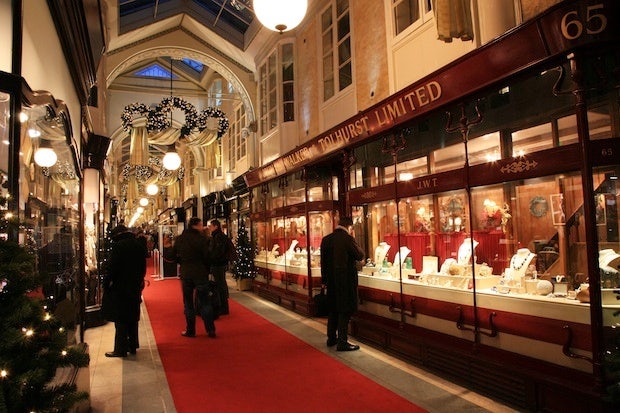
The Burlington Arcade, a 19th century European shopping gallery, behind Bond Street in London. (Shutterstock)
As British Prime Minister David Cameron wrapped up his China visit on Thursday, news arrived that UK government efforts to improve economic ties with China have certainly paid off: official British statistics show that Chinese visitor spending in the first half of 2013 has grown by a massive 132 percent year on year, totaling 181 million pounds. One city that may not be feeling the Chinese tourist love, however, is Paris, which is seeing lower sales in some industries.
Britain's enormous revenue influx is a result of concerted efforts to attract Chinese tourists: the government announced in October its plans to loosen visa restrictions for visitors from the mainland with the support of businesses in the London Luxury Quarter, which launched a VIP marketing campaign for Chinese travelers to accompany the reform.
The efforts aren’t over yet: British Culture Secretary Maria Miller said on Thursday that Britain hopes to become “the most welcoming destination in Europe” for Chinese visitors, and a new campaign is set to be launched in spring 2014.
However, at the same time the UK is seeing such wild success in courting Chinese travelers, Paris isn’t doing as well as it used to. According to a new report by iFeng, some retailers in France are seeing slowing sales from Chinese shoppers (translated from Chinese):
But according to a survey by the Paris magazine Challenges, in this year's summer and autumn busy tourist seasons, Chinese tourist spending on luxury goods in France has seen a downward trend. For example, in the case of specific brands, of 24 brands at Lafayette in Paris, nearly 18 watch brands saw September sales fall. Omega, a brand popular with Chinese customers, saw September sales fall by 36 percent, while sales of Dior, Chanel, and Chopard and also fell by a similar margin. Because 70 percent of Chinese tourists traveling abroad are male, watches are a preference among Chinese shoppers traveling overseas, followed by designer handbags. Therefore, shrinking sales by famous watch brands are likely to make merchants pay close attention.
Because the report attributes declining Chinese luxury spending in France mainly to watches, it’s likely that London isn’t snatching shoppers directly away from Paris. Rather, the Chinese government’s ongoing anti-extravagance campaign appears to be having more of an effect on the types of luxury goods offered in France rather than those in the UK. It’s no surprise that watches are in a slump, as they have been one of the hardest hit sectors in China as a result of the government crackdown. Meanwhile, British luxury brands such as Burberry and Paul Smith offer items less associated with extravagant gifting and more geared toward customers buying for themselves or family and friends.
Paris has long been a popular destination for China’s wealthy, and has been making its own efforts this year to stay at the top of its game. In response to a spate of recent robbery incidents involving Chinese tourists, the government announced this summer its initiative to step up security in tourist-heavy areas. Some efforts have been more useful than others, however—a guide for local businesses on Chinese tourists released by the Regional Tourism Council of the Paris Chamber of Commerce offered somewhat patronizing generalizations earlier this summer.